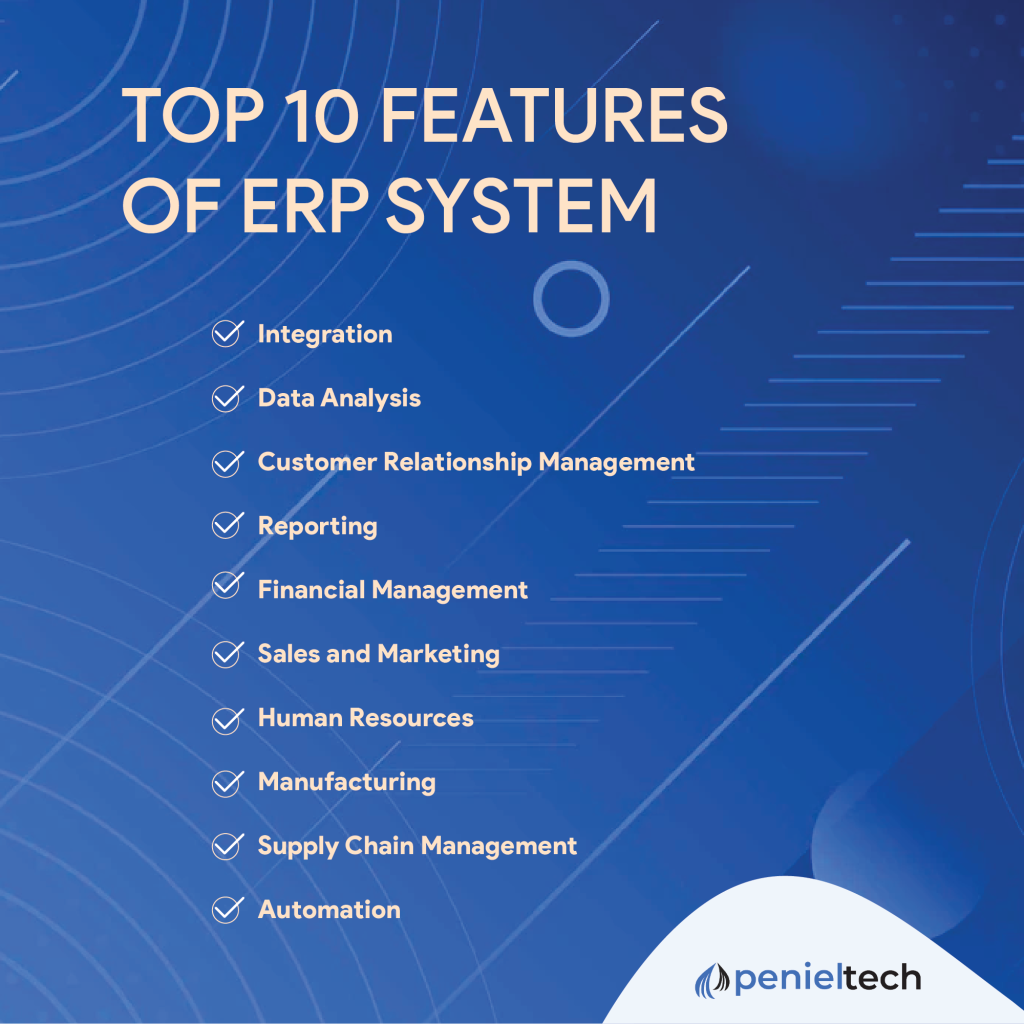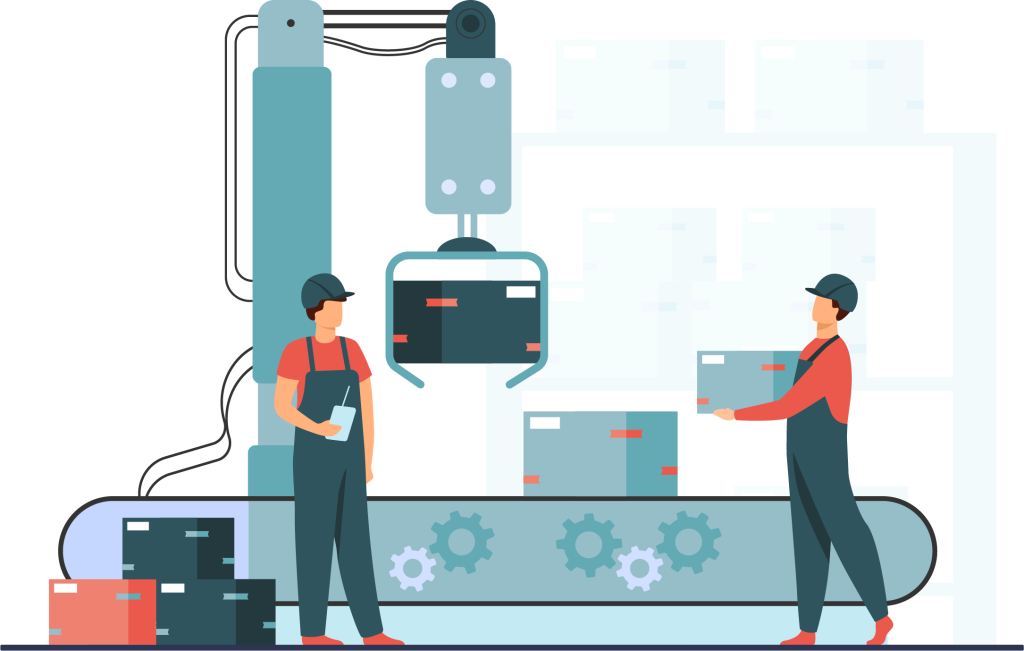What is ERP Software?
Enterprises use such software to manage routine business operations like accounting, purchasing, project management, risk management, compliance, and supply chain management (ERP).
Enterprise performance management software, which aids in planning, budgeting, forecasting, and reporting an organization’s financial results, is also a component of a full ERP suite.
This program offers a wide range of crucial features that combine every division of a company to give a real-time view of data and tasks.
It effectively oversees departmental operations to improve decision-making and advance the organization.
ERP software solutions rank well among the greatest options accessible there when it comes to organizations of a large scale.

Let’s discuss the top common features of ERP
1. Integration
The incorporation of software with any third-party app or software is what is referred to as integration.
With the aim of facilitating data sharing between various systems to increase productivity and insights, ERP offers integration tools that allow ERP to interact with other applications and/or systems.
This finally aids in streamlining your overall workflow, which boosts productivity and efficiency.
Every organization operates differently, so some additional supplemental bespoke software solutions could be required to interact with ERP software.
Today, silos for sales, engineering, accounting, and other bespoke software development companies are no longer viable.
2. Data Analysis
For a corporation to understand its business strength, a report must be prepared. But you must first acquire information in order to prepare this report.
Having a single ERP system allows all aspects of your firm to exchange data on daily operations.
Additionally, data can be broadcast to a number of streams, giving businesses access to real-time feedback for improved decision-making.
Production, operations, and finance departments have access to this data for every transaction that occurs in your company, including financial as well as operational ones like inventory control and sale payment.
Companies must gather as much data as possible, and present it in a way that is both visually appealing and easy to understand in order to stay ahead of the competition.
3. Customer Relationship Management
For every organisation, managing customer relationships is the most important stage.
You must keep your customers satisfied if you want to succeed in business.
However, because of the complexity of this, you must rely on software. CRM functionalities are available in ERP software.
It broadens the perspective of the firm by incorporating all data related to customer relationships.
A shared, easily available database contains all client data, including contacts, order history, purchase orders, and also prospect status.
4. Reporting
Creating eye-catching images, compiling historical data, and helping to analyse and present your results are all part of reporting.
You must write a report in order to analyse the data. Many software packages offer this reporting capability. Almost any form of data can be used to make reports.
This comprises lead management, sales activity, marketing performance metrics, and contact management.
Businesses are using business intelligence solutions to assist them base important choices on data from both financial and non-financial key performance indicators.
Better reporting can enable executives and stakeholders to make business decisions that are more informed, such as improving how you manage your company and seeing issues before they arise.
5. Financial Management
Financial management is required in order to keep track of expenses and revenues for growth.
Organisations use accounting to manage assets, produce accurate financial reports, and improve spending decisions.
As a result, accounting software can be considered a part of ERP software.
Accounts Receivable, Accounts Payable, General Ledger, Financial Reporting, and frequently Payroll are crucial elements of accounting.
Additionally, it gives managers access to real-time information.
ERP offers applications for supply chain management, inventory management, human resources, and eCommerce in addition to its accounting feature.
6. Sales and marketing
The ability to sell, upsell, create bids and buy orders, predict, manage commissions, and keep track of crucial information like profit margins and ratios is another advantage that ERP systems with integrated CRM provide to marketing and sales teams.
The ability to generate more leads, swiftly develop and implement campaigns, and monitor client activity throughout the sales cycle may be advantageous to marketing teams.
To deliver a great client experience throughout the whole sales pipeline, sales and marketing teams work closely with their counterparts in finance and operations to utilise ERP services.
7. Human Resources
The majority of ERP software includes some level of human resource management, although standalone solutions are more common.
These features enable the storage of employee data and the automation of processes affecting the people in your company, such as employee scheduling, hiring, and increasing productivity.
By enabling managers to more effectively allocate employee time and resources, HR capabilities in ERP software help your organisation achieve its goals.
This results in a more productive and successful firm through improved employee record keeping and improved employee performance.
8. Manufacturing
Manufacturing has been the foundation of ERP as a function.
By helping with product planning, raw material sourcing, production monitoring, and forecasting, today’s systems improve manufacturing operations.

Modules for product tracking, distribution planning, shop-floor control, work order administration, bill of materials management, and assembly management are additional components.
The use of ERP manufacturing technologies improves a company’s capacity to automate and manage key inventory planning and forecasting choices.
9. Supply Chain Management
Manufacturers, logistics companies, distributors, suppliers, and retailers may manage the flow of goods and services between locations as effectively and economically as possible with the aid of supply chain management (SCM) technologies included in ERP software.
This offers help from the purchase of raw materials to the delivery of a finished good to a consumer.
Demand planning, supply chain process control, as well as execution are all things that SCM features can handle end to end.
Most importantly, it took full advantage of cost-saving options to provide products from the vendor to the client.
10. Automation
An ERP system can automate payroll, order processing, invoicing, reporting, and other repetitive business operations.
Automation speeds up data entry, lowers errors, and frees up staff time for tasks that bring more value.
Due to the nature of ERP systems, information entered by one user is accessible to all users within the company.
So, for instance, when a specific SKU becomes available, an inventory tracking module may instantly initiate a shipment and invoice.
This results in increased income and improved customer satisfaction.
Or, to help them make decisions, line-of-business leaders may immediately receive the most recent statistics on cash flow and other metrics.